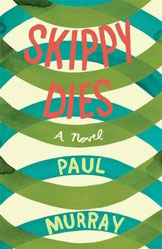Life Lessons
Skippy Dies by Paul Murray
 Set over the course of a single term in elite boarding school Seabrook College for Boys, Skippy Dies is Irish writer Paul Murray’s second novel. With its 140 year history of educating the cream of Dublin society, Seabrook provides Murray with the perfect backdrop to bring to life the contemporary Irish question: how to embrace the future without throwing away the past?
Set over the course of a single term in elite boarding school Seabrook College for Boys, Skippy Dies is Irish writer Paul Murray’s second novel. With its 140 year history of educating the cream of Dublin society, Seabrook provides Murray with the perfect backdrop to bring to life the contemporary Irish question: how to embrace the future without throwing away the past?
This is a well worn theme and to bring a fresh take to it Murray uses an extensive cast of both students and teachers. His chapters are short with multiple narrators and this creates a buoyant energy and allows him to introduce a rich tapestry of themes which he handles deftly. Beneath the humour and rollicking pace Murray’s characters lead us to darker subjects – drugs, eating disorders, child abuse – and like a conductor of a large and eclectic orchestra he seems to hit just the right note at just the right time. Which is more than can be said for the quartet at Seabrook’s 140th anniversary concert.
Within this dizzying cast, two characters take centre stage more than most; history teacher, Howard ‘The Coward’ Fallon and second year student, Daniel ‘Skippy’ Juster of the title. Howard is obsessed with the past, his own and the collective, and over the course of the book he slips deeper and deeper into this, in a bid to avoid his future. By contrast, we know Skippy’s future is limited, as the novel opens with his untimely death on the floor of Ed’s Donut house. Murray works back to show us the events that led up to the tragedy and this, together with its impact on Seabrook’s teaching and student body, becomes the driving force of the plot.
The quirky symmetry between the boys and their teachers is well drawn with the same roles played out behind the staff room and rec room doors. While at times, this reviewer found herself wondering if this is a novel for teenagers or adults, perhaps this is the whole point; that the grey haze of adolescence doesn’t always clear to black and white upon graduation and that some lessons are a cycle that we need to learn, not once, but again and again.
Much has been written about the whirlwind of Irish economic growth and more recent contraction, and how as a society we have dealt with and not dealt with change. Setting this up as a backdrop for a novel is a risk, but one that pays off for Murray, not only because of his scalpel sharp prose but because of the reminder in the novel’s subtext; that there is something more, something deep inside us, something that no matter what changes, will always stay the same. In the end, Skippy Dies works not just because it is funny and tragic and compelling, but because like any good teacher, Murray leaves us with a lesson that we remember long after we’ve left the classroom.
